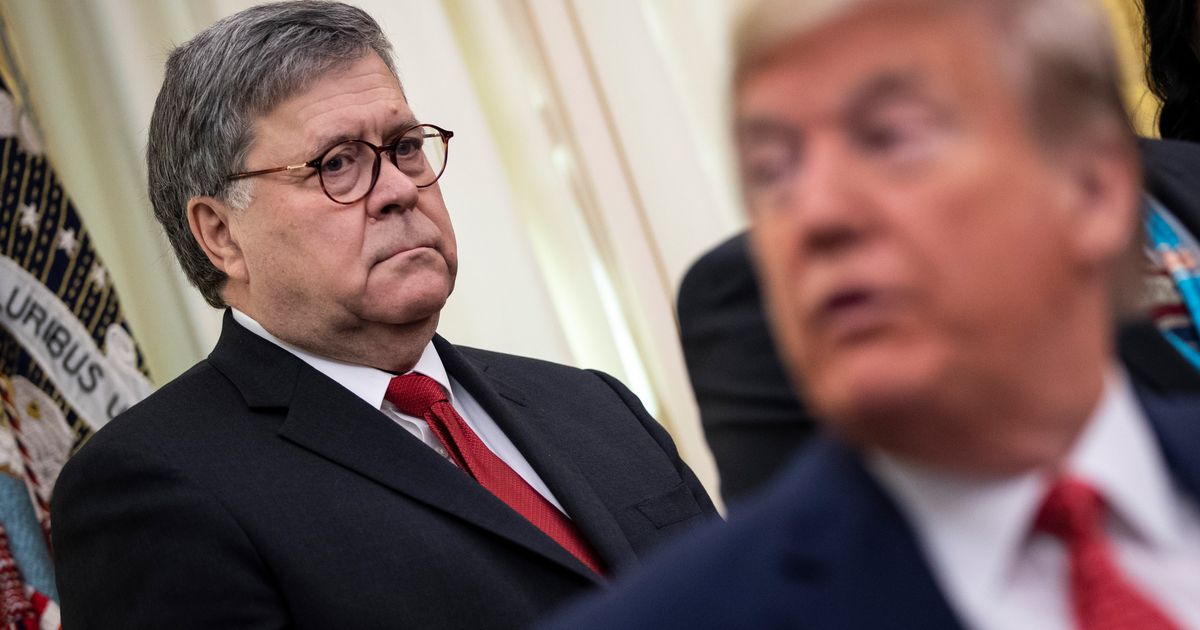Play all audios:
Photo: Drew Angerer/Getty Images In early 2019, Attorney General William Barr testified to Congress that Donald Trump’s campaign had been spied on, and that he intended to get to the bottom
of it. “He’s going to look at the role of other intelligence agencies too, he made that clear in the Senate,” gushed _Wall Street Journal_ columnist Kimberley Strassel at the time. “Not just
the FBI, but what was the CIA doing?” Barr is now leaving, and for his loyal service to the party, he is collecting a round of valedictory tributes from Trump defenders like Strassel, who
lavishes him with a series of compliments that has been published as an “interview.” During their talk, Barr casually notes that his ongoing probe of the Russia investigation has not
produced a smidgeon of evidence that the CIA actually did spy on Trump’s campaign. “Barr had come to the conclusion that he didn’t ‘see any sign of improper CIA activity’ or ‘foreign
government activity before July 2016,’ he says. ‘The CIA stayed in its lane.’” (Strassel had previously devoted an entire 2018 column to charging the CIA with “egging on” the FBI probe of
trump.) Barr has also found nothing close to justifying his sweeping accusations of illegal spying by the FBI, either. He prepares Strassel to be gently let down on this score whenever that
investigation concludes, but insists that even if the FBI didn’t illegally surveil Trump’s associates, it violated some sort of moral code: > The attorney general also hopes people
remember that orange > jumpsuits aren’t the only measure of misconduct. It frustrates him > that the political class these days frequently plays “the criminal > card,” obsessively
focused on “who is going to jail, who is > getting indicted.” > > The American system is “designed to find people innocent,” Mr. > Barr notes. “It has a high bar.” One danger of
the focus on > criminal charges is that it ends up excusing a vast range of > contemptible or abusive behavior that doesn’t reach the bar. The > FBI’s use “of confidential human
sources and wiretapping to > investigate people connected to a campaign was outrageous,” Mr. > Barr says—whether or not it leads to criminal charges. What makes this argument
especially rich is that, in the same interview, Barr insists Trump and his campaign were completely innocent, simply because Mueller was unable to charge a criminal conspiracy with Russia.
“Of course the Russians did bad things in the election,” he tells Strassel. “But the idea that this was done with the collusion of the Trump campaign—there was never any evidence. It was
entirely made up.” There was, in fact, a _lot_ of evidence. Trump’s campaign accepted a meeting with an open Russian agent promising campaign help; Trump’s campaign sent Michael Flynn to
obtain stolen Clinton emails; Roger Stone claimed to have a back channel to WikiLeaks to coordinate exploitation of the stolen emails; his campaign manager shared private polling data with a
Russian spy; and Trump went on camera to ask Russia to steal more Clinton emails. The Mueller report states, “In some instances, the Campaign was receptive to the offer” of Russian
assistance, but that the cooperation did not constitute a criminal conspiracy. As the Mueller report noted, it defined its task as establishing crimes, and it didn’t prosecute collusion
because collusion is not a crime. “In evaluating whether evidence about collective action of multiple individuals constituted a crime, we applied the framework of conspiracy law, not the
concept of ‘collusion.’ … Collusion is not a specific offense or theory of liability found in the U.S. Code; nor is it a term of art in federal criminal law.” Even though it failed to
establish a criminal conspiracy between Trump’s campaign and Russia, the Mueller team did find many crimes and secured prosecutions or guilty pleas by Trump’s campaign manager Paul Manafort,
his deputy Rick Gates, Trump’s national security adviser Michael Flynn, his adviser Roger Stone, and his lawyer Michael Cohen, among others. In Barr’s calculus, the crimes don’t count
because they’re not collusion, and the collusion doesn’t count because it’s not a crime. So despite being receptive to Russian assistance, seeking out more of it, and exploiting its illegal
fruits, Barr considers Trump’s campaign totally innocent because none of those acts could be proven to violate a law. Yet the FBI’s decision to investigate these acts, which produced
numerous criminal convictions, was deeply wrong, even if it _didn’t _violate the law. Barr wishes to be remembered as a noble statesman because, at the very end, he didn’t follow Trump’s
most delusional demands to their Rudy-esque conclusions. But Barr was and is a pure hack, and the double standard he constructs to justify Trump’s crooked campaign, and impugn the
investigators who pursued their crimes, is perfect evidence of his hackery.

